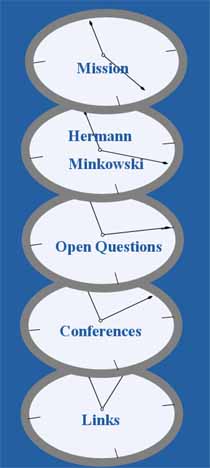 |
|
|
|
 |

|
|
What is the Significance of Relational Localization?
Dean Rickles
The hole argument for general relativity is often taken by physicists,
and some philosophers, to imply that localization must be based on
relations between physical fields, rather than based on relations to
the points of a spacetime manifold. The reason is that fields and
quantities defined at manifold points are not diffeomorphism-invariant.
Thus, the value of a field at a point is not measurable, but the value
of a field where a thing is, or where a field takes on a certain value
is measurable. The idea that there is no background (metric) spacetime
available to localize fields is known as background independence (it is
grounded in active diffeomorphism-invariance). Lately, background
independence has been taken to imply that a relational conception of
spacetime is the only tenable position available. The argument proceeds
by way of an entailment between background independence and relational
localization (along the lines of the hole argument: see Rovelli, 1992:
3). Diffeomorphisms change the localization of fields on spacetime; GR
is diffeomorphism-invariant; so localization *cannot* be relative to
spacetime. It must be relative to other fields. Rovelli (2000: 108)
then draws an explicit relationalism from this: since fields and
quantities are independent from the manifold, the manifold can (and
should) be dispensed with. My question is then: do these implications
and entailments hold? And, if not, what *is* the significance of
relational localization vis-a-vis the ontological status of
space(time)?
References:
Rovelli, C. (1992) ``What is Observable in Classical and Quantum
Gravity'' Classical and Quantum Gravity, 8: 297-316.
Rovelli, C. (2000) ``The Century of the Incomplete Revolution:
Searching for a General Relativistic Quantum Field Theory.'' Journal of
Mathematical Physics, 41(6): 3776-3800.
Rovelli, C. (2004) Quantum Gravity. Cambridge University Press.
S. Saunders. (2002) ``Indiscernibles, General Covariance, and
Other Symmetries''. http://philsci-archive.pitt.edu/archive/00000416/.
Smolin, L. (1991) ``Space and Time in the Quantum Universe''. In
A. Ashtekar & J. Stachel (eds.), Conceptual Problems
of Quantum Gravity. Birkha\"{u}ser, 1991: 228-291.
Smolin, L. (2004) ``The Relational Idea in Physics and Cosmology.''
Talk presented at BSPS meeting in Cantebury. To appear in S.French et
al. (eds.), Structural Foundations of Quantum Gravity.
|
|
|
 |
|
 |

